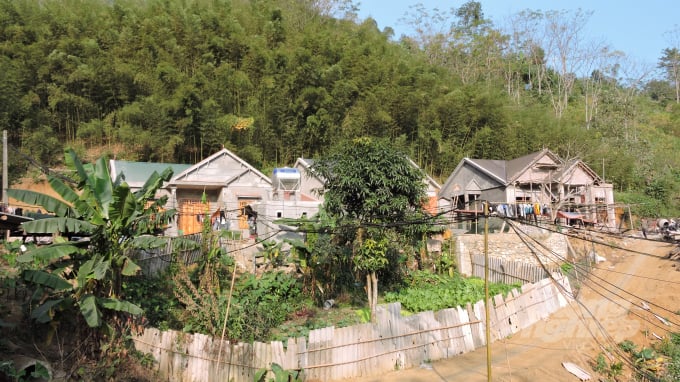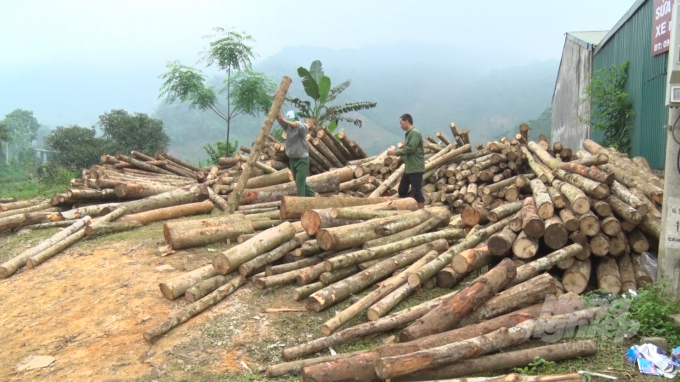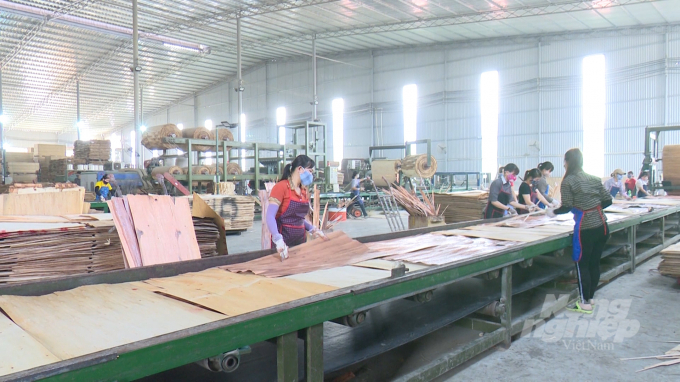June 18, 2025 | 16:30 GMT +7
June 18, 2025 | 16:30 GMT +7
Hotline: 0913.378.918
June 18, 2025 | 16:30 GMT +7
Hotline: 0913.378.918
Afforestation not only helps people in Bac kan Province get out of poverty but also get much higher income in recent years. It is now normal to see people there talking or bargaining to wood purchasing deals that are worth hundreds of millions of Vietnamese đong.

New houses are built in Pac Nam District after people get high income thanks to afforestation. Photo: Toan Nguyen.
Since 2000, Bac Kan province has been interested in implementing forestry economic development policies. Initially, people were supported with seeds and fertilizers to plant forests under major projects like Projects 327 and Project 611.
After only 8 - 15 years (depending on the type of trees), each hectare of the forest has generated an income from VND70 million to more than VND 200 million.
Trung's family in Thanh Mai commune, in 2010 was just a poor household. He had to borrow VND30 million from the Social Policy Bank to buy seedlings and fertiliser for growing more than two hectares of forest.
By 2018, he could harvest the planted forest, Trung said, adding that his family earned nearly VND200 million which helped him to pay the principal and interest on the previous bank loan and purchase many valuable properties.
Trung said thanks to afforestation, people's lives are getting better and better.
“In Thanh Mai commune now, no one leaves the land unused. After exploiting the forest, they will replant others immediately,” he said.
“Afforestation brings high income, each hectare of acacia until harvest generates also from VND80 to 100 million, depending on the location of exploitation,” he said..
Coming to the highland villages across Bac Kan province, the better off and richer households mostly get their income from the forest. Moreover, when people know how to appreciate and live in the forest, the story of forest protection is much easier.
Nguyen My Hai, Deputy Director of Bac Kan Province’s Department of Agriculture and Rural Development said that in 2021, more than 5,000 hectares of new forests were grown in the province, an increase of 141 per cent compared to 2020. With forest coverage of 71 per cent, the province is considered a "supergiant air conditioner" for the whole country.

Afforestation not only helps people in Bac kan Province get out of poverty but also get much higher income in recent years. Photo: Toan Nguyen.
Currently, a hectare of acacia at the age of exploitation costs VND70 - 120 million. In some areas of speciality fruit trees, afforestation has become a widespread movement in Bac Kan province. People no longer expect and rely on the State anymore, but put their own money or borrow money from banks to invest in afforestation.
At the same time, the protection and development of forests are given special attention to the province leaders. In the period from 2009 to 2020, only in two poor districts of Ba Be and Pac Nam, 18,000 households were supported with afforestation, 660 poor households contracted to protect and take care of forests.
Nguyen Dinh Diep, Chairman of the People's Committee of Pac Nam District said that the development of forests was very good so far, providing a stable income for ethnic minorities.
However, at present, there are still very few workshops and wood processing factories in the locality, The wood processing are mainly manual and small-scale.
Pac Nam District especially called on investors to invest in the wood processing sector, which is not only about taking advantage of available materials but also contributing to improving the value of forests.
In recent years, Bac Kan province has had many policies to attract investment and create favourable conditions for all economic sectors to participate in forest planting and wood processing. In the 2016-2020 period, Bac Kan province focused on investing in developing advantageous industries such as processing agro-forestry products associated with raw material areas.

Wood processing industry in Bac Kan still has great potential to welcome investors. Photo: Toan Nguyen.
According to Bac Kan Province’s Department of Industry and Trade, the processing industry in recent years has always accounted for over 50% of the industry; the proportion increased from 53.48% in 2015 to 65.72% in 2020. This is also the field with the highest average growth in the province's industry, estimated at 16.64%/year. Prominent in the processing and manufacturing industry is agro-forestry product processing, specifically wood processing.
Bac Kan province has attracted some agro-forestry product processing projects including Bac Kan wood processing factory project with a capacity of 120,000 cu.m of plywoods per year of Govina Joint Stocks Compan, wood processing project of Lechenwood Vietnam Co., Ltd. with a capacity of 30,000 cu.m of plywood/year and 200,000 cu.m of timber flooring/year, a project on wood processing production with a capacity of 12,000 cu.m of plywood products/year, 3,000 cu.m of finger joint board products/year of Hong Ngoc Trading and Production Ltd Company.
The projects have been put into relatively stable production and have created several key industrial products, contributing to increasing the value of industrial production in the locality. However, businesses operating in the field of wood processing in Bac Kan province can only handle a part of locally planted forest wood products. Most of the harvested wood still has to be exported to Thai Nguyen and Bac Giang. Therefore, the wood processing industry in Bac Kan still has great potential to welcome investors.
Translated by Hien Anh

(VAN) After 5 years of implementation, the CAI initiative has helped coffee growers change their farming practices, moving toward responsible agriculture that meets global export standards.

(VAN) The primary prerequisite for the comprehensive and robust integration of Vietnam's livestock sector into the global value chain is the establishment of a disease control system.

(VAN) The results of national programs are essential for establishing a contemporary livestock sector that is well-equipped to meet the demands of both domestic and international markets, with robust biosafety standards.

(VAN) The UNESCO Global Geopark revalidation of Non nuoc Cao Bang and the transition to a two-tier administrative model are presently undergoing a pivotal moment in Cao Bang, the northernmost province of Vietnam.
/2025/06/13/5330-2-004539_953.jpg)
(VAN) Changing policy mindset and removing investment barriers are urgent requirements to open up new development space for enterprises in the agricultural sector.

(VAN) The areas include the restoration of five million hectares of marine ecosystems.

(VAN) Dr. Le Van Nguyen, Director of the Institute of E-Commerce Management (ECM), emphasizes the potential for green development through the cultivation of fruit trees, particularly in provinces such as Son La.